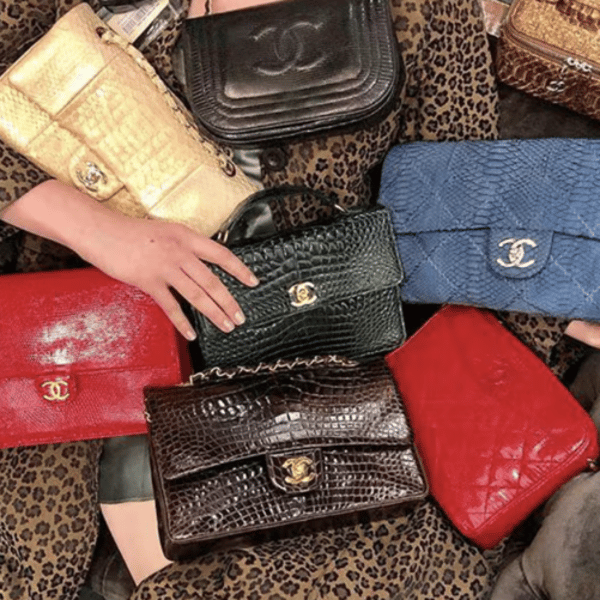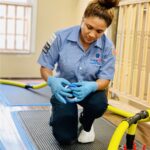
Chanel wins case against luxury vintage reseller What Goes Around Comes Around
Last Updated on February 8, 2024 by Admin
[ad_1]
Chanel has flexed its brand-protective muscle and came out on top. In a landmark trial that lasted nearly a month, a jury has ruled in favor of the French luxury behemoth for its claim that New York-based indie vintage reseller What Goes Around Comes Around far exceeded first sale doctrine practices and sold fake Chanel products, knowingly or otherwise. The retailer, also known as WGACA, is beloved among vintage lovers and the fashion industry, who have used it as a styling and inspiration source since it opened 30-plus years ago. The three-store Soho-based enterprise became the first secondary market reseller to face the iconic brand—founded by Coco Chanel and known to go further than most to protect its intellectual property—in a courtroom. The case was first filed against WGACA in 2018, with many facets having been decided by the court ahead of this trial; the courts deemed a jury would need to determine if WGACA was guilty of trademark infringement and having knowledge of the unauthenticated goods they had on offer. As predicted, the case will go to an appeals court.
Following the news Tuesday, Seth Weisser, CEO and co-founder of What Goes Around Comes Around, issued the following statement:
“We are incredibly disappointed with today’s verdict; however, the case is not over. The court has yet to hear post-verdict motions. We will have further comment after the case is final. We look forward to the post-verdict motions as we explore our legal options.”
“WGACA has always had a rigorous authentication process and has never in the history of the company sold a non-genuine or counterfeit product. Today’s verdict was not about not selling a counterfeit; it was about WGACA selling items that were voided in Chanel’s database. Without any access to this database the resale industry would not know the status of these serial numbers. We continue to stand by our 100% authenticity guarantee.”
In an email exclusive to FashionNetwork.com, Weisser clarified some of the practical aspects of the ruling as it stands now. “This case has no bearing on our ability to continue to offer authentic Chanel products as we always have. Furthermore, as a result of this case, we have already begun to alter hashtag usage just because they are not that important to our social media platforms. We continue to offer and properly offer Chanel on WGACA Live and throughout the business,” he said.
Going to trial is presumably a much costlier affair for WGACA as Chanel is generally presumed to retain legal counsel. A lawyer for Chanel at the trial alleged that between 2016 and 2022, WGACA sold $90 million worth of pre-owned Chanel products, thus roughly $15 million each year. The product offerings are generally accessories, primarily bags, which range in price from approximately $2,000 to $12,000. An average of $6000 a bag amounts to 2500 Chanel bags yearly, averaging almost 7 per day. It’s nearly impossible to ascertain this claim made by Chanel, and it is equally challenging to imagine WGACA was doing that much sales volume from one brand.
While WGACA disagrees this amount is accurate, Weisser did say that Chanel products account for 15 percent of its overall business and that in terms of its top-selling brands, Chanel ranks third behind Louis Vuitton and Gucci.
Indeed, crucial to the case were 50 serial numbers that went missing in the early Nineties which Chanel itself testified that it took 16 years for them to ascertain they were stolen. WGACA unknowingly found itself with one of these bags that for all intents and purposes presented as any other genuine Chanel bag. (It does beg the question if one of the Chanel authorized factories was responsible for the theft as these serials numbers are assigned to bags at the point of production.) WGACA’s position is that as they do not have access to Chanel’s internal serial number tracking system, how could they have known something with these numbers were fake?
Additionally, Chanel had claimed WGACA exceed first sale doctrine through its use of the word Chanel and its logos in marketing initiatives such as hashtags on its social media channels.

FashionNetwork.com spoke with Julie Zerbo, a lawyer and the founder of The Fashion Law, a modern news and information company exploring the legal and commercial challenges facing the retail industry on the landmark case. While it was extremely nuanced to WGACA’s practices, the trial stood to impact the entire resale eco-system which has burgeoned in the last decade and in many cases, competing for the same first market customers as its secondary market consumer.
To clarify, Zerbo points out that its perfectly legal to resell authentic goods and in doing so they can describe a product, use its name and list its selling price.
“Chanel is not taking issue with that but alleges WGACA went further, and this goes beyond the fair use of the Chanel branding. Chanel claims through using hashtags and Chanel imagery and pictures of bags not even up for sale by WGACA, it was meant to mislead the consumer these two companies are affiliated,” she explained in a phone interview on January 31st adding, “Some of the big issues that will impact resellers across the board is how much of a company’s branding trademarks and imagery can you use to market presumably authentic goods. It’s permissible for a company to resale an authentic product without the fear that someone will bring a lawsuit against them as the first sale doctrine perfectly states this,” she added. Zerbo also noted that the WGACA is extremely nuanced so it is hard to gauge how it will impact the larger resale market.
During the trial Joyce Green, managing director of Chanel France testified that since November 2020 she hadn’t encountered any customer or retailer being confused about WGACA’s offerings in conjunction with Chanel. Though Zerbo attests that customer confusion is just one technical point of confusing customer engagement as the basis for trademark infringement that the court weighs to make that determination; it’s an array of factors such as how similar the trademarks are, how similar the goods are or how sophisticated the consumers are.
The nuance is in part due to this rare situation of the lost serial numbers which in at least one case was located on one of the Chanel bags WGACA was selling. According to lawyers from WGACA, the case helped Chanel solve their unsolved missing serial number situation.
“What is interesting is that what Chanel is trying to argue is that if bags are put into the market without their authorization and without being subject to the quality control and authentication processes that they have in place for however long which includes assigning a serial number, even if its “allowed” to offer up goods for resale without the trademark owners authentication, if Chanel never put those bags in the marketplace in the first place then the entirety of the first sale doctrine doesn’t apply and WGACA can’t argue that as a defense; that is the underlying issue and argument,” Zerbo offered.
For its part, Chanel released the following statement once the verdict was reached.
“Chanel would like to express its deep gratitude to the jury for their service during the trial, which lasted nearly one month.
Chanel welcomes the ruling, which demonstrates Chanel’s unwavering commitment to protecting consumers and its brand against all false association, trademark infringement and counterfeiting, and false advertising. Such infringements hurt consumers and harm the Chanel good will and brand, because they are likely to confuse the public as to the nature of the CHANEL-branded items they are purchasing.
Second-hand platforms, when they operate with transparency about the CHANEL-branded items they sell and cooperate with law enforcement and Chanel can help in the fight against counterfeiting.
We look forward to the next phase of the trial, which relates to damages”
Copyright © 2024 FashionNetwork.com All rights reserved.
[ad_2]
Source link





